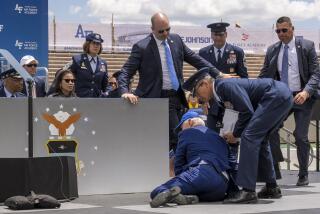Biden Looks Back Ruefully at His Campaign ‘Naivete’
- Share via
WASHINGTON — Sen. Joseph R. Biden Jr. (D-Del.), closing the book on a year when his presidential campaign crashed because “I was doing all the wrong things,” has a 1988 agenda focused on the foreign policy challenges that will face the United States between now and the end of the century.
In the first long interview since he ended his campaign Sept. 23 in a swirl of controversy over alleged plagiarism and exaggeration of his academic record, the 45-year-old senator said the experience taught him “a hell of a lot of lessons” about himself and what he repeatedly referred to as his “naivete.”
“I have had an object lesson,” he said. “I don’t know if I will ever run for President again, but I know if I do, the best way to prepare for it is not to run this time, but to do my job, to learn more about the issues I’m dealing with, to demonstrate the staying power and the seriousness a lot of you (reporters) doubted that I have.”
At no point in the two-hour interview did Biden criticize the decision of former Colorado Sen. Gary Hart to reenter the race Hart abandoned several months before Biden’s withdrawal. But everything Biden said about his own decisions implicitly drew a contrast with Hart.
‘How Naive’
Biden seemed almost eager to acknowledge his errors of judgment, saying at least five times that he is amazed at “how naive I was” about the demands of a presidential candidacy. He rejected the charge of plagiarism--stemming from several of his campaign speeches and from an earlier incident as a law student--and said, “At some point, I’m going to address that issue again, because there are things there that have to be corrected for the record whether or not I ever run for President again.”
But he said even if that issue had not arisen, “my campaign would have been in trouble,” because “I just messed up, frankly,” so many aspects of it. “I got mired in personalities,” he said, “not my opponents’ but my own political operatives.
“I never solved the guru problem,” Biden said, referring to his previously close relationship with political consultant Patrick Caddell--with whom he has severed professional relations. “When Johnny Apple (New York Times correspondent R.W. Apple Jr.), a reporter I really respect, said Joe Biden was an empty vessel into which Pat Caddell poured a candidacy, I was stunned.
“I was so naive about things. I got into politics because of my concerns about issues, because of my beliefs. People in Delaware, I think, know that. But people here (Washington) didn’t know me, and they didn’t know what issues were important to me. And suddenly, I’m out there talking about moving a nation, moving a generation, and you guys naturally say, ‘What’s this guy up to?’ And you see me sometimes actually move an audience, so you say, ‘Hey, this guy could be dangerous.’ Everything I was doing to move an audience made you doubt more that I was fit to lead the country or run the government.”
In the weeks after he left the presidential race, Biden said, “I thought about leaving politics. But I have an opportunity to do something I like a lot--being a senator. And that’s what I’m doing.”
‘First Marker’
Biden said the work he did in the last four months of 1987 as chairman of the Senate Judiciary Committee hearings on the Supreme Court nominations of Judge Robert H. Bork and Judge Anthony Kennedy was “the first marker” he laid down on his new path. Although he announced his opposition to Bork in advance of the hearings, he drew bipartisan praise for the fairness of his conduct of them.
Biden said he thinks that the hearings, which built the case that defeated Bork, began to answer the doubts of those “who questioned whether I could discipline my temper and my mouth . . . whether I could prepare substantively.”
In 1988, he said, he will focus on his role as the ranking Democrat on the Senate Foreign Relations Committee, seeking to lead a national debate on arms control, the future of U.S.-Soviet relations and the NATO alliance, and ways to resolve conflicts between Congress and the executive branch over the use of force by the United States in Third World or regional conflicts.
The new work begins Monday when Biden leaves for a 12-day European trip, which will include meetings with British Prime Minister Margaret Thatcher, French President Francois Mitterrand, West German Prime Minister Helmut Kohl and NATO leaders in Brussels.
Chairman’s Request
The trip is being made at the request of Foreign Relations Committee Chairman Claiborne Pell (D-R.I.), who has asked Biden to serve as co-chairman of the committee hearings this winter on the Intermediate-range Nuclear Forces (INF) Treaty with the Soviet Union.
More to Read
Get the L.A. Times Politics newsletter
Deeply reported insights into legislation, politics and policy from Sacramento, Washington and beyond. In your inbox twice per week.
You may occasionally receive promotional content from the Los Angeles Times.










